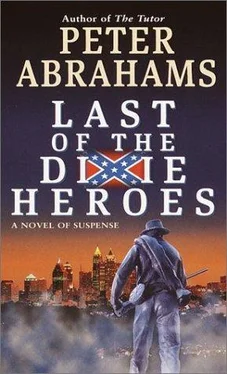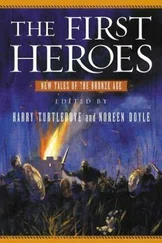Peter Abrahams - Last of the Dixie Heroes
Здесь есть возможность читать онлайн «Peter Abrahams - Last of the Dixie Heroes» весь текст электронной книги совершенно бесплатно (целиком полную версию без сокращений). В некоторых случаях можно слушать аудио, скачать через торрент в формате fb2 и присутствует краткое содержание. Жанр: Триллер, на английском языке. Описание произведения, (предисловие) а так же отзывы посетителей доступны на портале библиотеки ЛибКат.
- Название:Last of the Dixie Heroes
- Автор:
- Жанр:
- Год:неизвестен
- ISBN:нет данных
- Рейтинг книги:4 / 5. Голосов: 1
-
Избранное:Добавить в избранное
- Отзывы:
-
Ваша оценка:
- 80
- 1
- 2
- 3
- 4
- 5
Last of the Dixie Heroes: краткое содержание, описание и аннотация
Предлагаем к чтению аннотацию, описание, краткое содержание или предисловие (зависит от того, что написал сам автор книги «Last of the Dixie Heroes»). Если вы не нашли необходимую информацию о книге — напишите в комментариях, мы постараемся отыскать её.
Last of the Dixie Heroes — читать онлайн бесплатно полную книгу (весь текст) целиком
Ниже представлен текст книги, разбитый по страницам. Система сохранения места последней прочитанной страницы, позволяет с удобством читать онлайн бесплатно книгу «Last of the Dixie Heroes», без необходимости каждый раз заново искать на чём Вы остановились. Поставьте закладку, и сможете в любой момент перейти на страницу, на которой закончили чтение.
Интервал:
Закладка:
And they were right back where they’d left off ten or eleven years ago. Roy and Marcia, at Marcia’s insistence, had brought Rhett up to see his grandpappy. It was Marcia’s first meeting with him too: Roy’s father hadn’t made it to the wedding. The get-together, at the Pizza Hut off exit eleven on 75, had lasted forty minutes, about twenty minutes too long.
“Why don’t you give me directions and a list of things you want and I’ll be going,” Roy said.
“What’s wrong with the name we already got?”
“Just write it down,” Roy said, finding a pen and an old envelope in his pocket, laying them on the tray table. His father wrote on the envelope, handed it to Roy.
“You dint answer my question-what’s wrong with the name we already got?”
Roy read the list: breefs, 3 bags cheetoz, 1 bottel (over sink). He looked up at his father. “A boy needs a name of his own,” he said.
“What’s that supposed to mean?”
By the time his father had repeated the question, louder this time, Roy was out in the hall. A doctor was writing on a chart. Roy waited for him to finish, introduced himself, explained about the call on his answering machine. “Glad it’s just a false alarm,” Roy said.
“False alarm?”
“With the way he’s sitting up, watching TV, eating.”
“I rejigged his medication a bit,” the doctor said. “He seems to be responding well.”
“So was the problem with his liver or the previous medication?”
“I don’t quite get what you’re saying,” the doctor said. A phone beeped in the pocket of his white coat. “Excuse me,” he said, putting the phone to his ear. After a while, he said, “Is that the one with Johnny Depp?” Roy went out to the parking lot.
Roy followed the diagram on the envelope. East on 40 in light traffic, north on 315 in almost none, second right past “prair hall,” and left on the first paved road, all by himself.
The road climbed a hill, rounded a bend. Potholes appeared, more and more frequent until they became the road itself. Roy’s headlights picked out a tumbling black stream behind tall trees, an unlit house with a tarpaulin sagging from the roof, another house with a blue TV light glowing in the back. The climb grew steeper, the turns tighter; the road narrowed to a single lane. There were no houses now, just trees covering steep slopes on either side, and sometimes a clearing, one with a still, bear-shaped shadow in the middle. Roy flicked on the inside light, glanced down at the diagram. His father had marked an X at the end of the road, but there was no indication of distance. Roy kept going, higher and higher. It was far from silent, especially with the state of Roy’s muffler, but he felt silence all around him, just the same. He tried the radio; nothing he wanted to hear came in clearly. Roy settled for his management tape.
It’s only fair I get a raise, Carol.
Why is that, Jerry?
Because Tony’s making ten percent more than me.
Jerry’s right. Tony is making ten percent more. Carol knows Tony was approached by a headhunter promising a higher-paying job at a rival company. She raised his salary in order to keep him. She’d like to keep Jerry too, but Jerry is not as valuable to the company and she doesn’t believe he deserves a raise. How can she deny Jerry and at the same time keep him a happy and productive member of the team?
Before Roy could learn the answer, his headlights shone on a wooden gate and the road came to an abrupt end. Roy stopped the car. stay to hell OFF was spray-painted on the worn, uneven slats of the gate; a strange gate with no fencing on either side, nothing to prevent someone from simply walking around it. Roy got out of the car, walked around the gate, across a dirt yard. Metal things gleamed here and there in the moonlight: a washer lying on its side, an engine block, a TV with a smashed screen, hubcaps. Beyond stood the house, a misshapen thing with a porch resting on cement blocks, duct tape on the window of the front room, a crooked chimney overhung by dark trees. Roy mounted the porch. It creaked under his weight. An animal cried out, not far away.
Roy paused in front of the door. Born in this house, in this fuckin’ house: he waited for the door, its dark paint chipped and peeling, to prod his memory, the way inanimate things were supposed to do sometimes. He felt nothing, but that might have been his fault: it occurred to him that maybe he missed a lot when it came to the subtleties of life.
Key’s under the mat. Roy bent down to somehow turn back a corner of the mat without getting any of the filth on him. His shoulder brushed the door. It swung open.
Roy went inside. He couldn’t see a thing, but he smelled many smells, none pleasant. He ran his hand along the walls on either side of the door, felt a switch, flipped it. A light went on over a sink, and a second one, hanging from the ceiling. The room had kitchen things in it-sink, card table, two card table chairs, icebox, stove; but there were living-room things too-frayed couch, TV; and bathroom things-a seatless toilet in one corner. Roy saw a spark, heard a little pop, and the hanging light went out.
Briefs, Cheetos, bottle. He’d seen the bottle already-Old Grand-Dad-on a shelf over the sink. There were two cupboards under the counter. One was empty, the other so full of Cheetos that the packages cascaded out when he opened it. That left the briefs. Roy went into the next room, the soles of his shoes sticking once or twice to the floor.
A shadowy room. Roy got the feeling he wasn’t alone, went icy on the back of his neck and between his shoulder blades. At the same time, something soft brushed his face. Roy snatched at it-a cord or string-and pulled. A light went on, a strange red light, as though for some fantasy bordello. But this was no bordello, just a small bedroom with a lopsided chest of drawers and a narrow unmade bed, littered with crumpled Cheetos packages, an empty bottle of Old Grand-Dad and-and what? Something dark on the pillow, something that gave a twitch, a twitch of a long tail. A rat, the biggest Roy had ever seen. He made some kind of noise, startled and scared. The rat leaped off the pillow, flew across the floor, disappeared through a hole in the wall.
When Roy got his breath back, he went to the chest and opened the top drawer. Didn’t most people keep underwear in the top drawer? Not his father. His father kept a jar of Vaseline and a magazine called Horny Black Bitches. Roy tried the next drawer, found a pile of socks and underwear that included a three-pack of briefs from Wal-Mart, still wrapped. He picked it up, uncovering a cigar box underneath.
Roy told himself, Don’t touch that box. What are you? The box is none of your business. But he didn’t believe that last part.
Roy took out the box, slid open the top. There were three photographs inside. The first was a faded Polaroid of a young woman in a summer dress. She stood on some steps-might have been church steps, Roy couldn’t tell-laughing at something, maybe the way the wind was blowing her hair around. An attractive woman, with lean arms and shapely calves. It didn’t hit him at first that she was his mother.
She was in the second picture too, a better-quality print, standing beside one of those test-your-strength hammer machines at a county fair. The man with her was wearing a sleeveless T-shirt and making a muscle. She was feeling it with her fingertips and going, “Oooh.” His ears were identical to Rhett’s. He didn’t have that pissed-off look in his eyes, just a Budweiser in his free hand.
The third photo was clipped from a newspaper. “DeKalb Whiz Signs Intent Letter with U. Georgia.” Roy had on his high school uniform and the funny haircut all the seniors had worn that year.
Roy stared at the picture, stared through it, trying to get the dates right. Senior year meant fourteen or fifteen years after he and his mother had left Tennessee, and nine or ten years before the visit with Rhett, the only time he’d been back. He closed the cigar box. What was he supposed to make of the contents? Roy didn’t know. He shut the drawer.
Читать дальшеИнтервал:
Закладка:
Похожие книги на «Last of the Dixie Heroes»
Представляем Вашему вниманию похожие книги на «Last of the Dixie Heroes» списком для выбора. Мы отобрали схожую по названию и смыслу литературу в надежде предоставить читателям больше вариантов отыскать новые, интересные, ещё непрочитанные произведения.
Обсуждение, отзывы о книге «Last of the Dixie Heroes» и просто собственные мнения читателей. Оставьте ваши комментарии, напишите, что Вы думаете о произведении, его смысле или главных героях. Укажите что конкретно понравилось, а что нет, и почему Вы так считаете.












